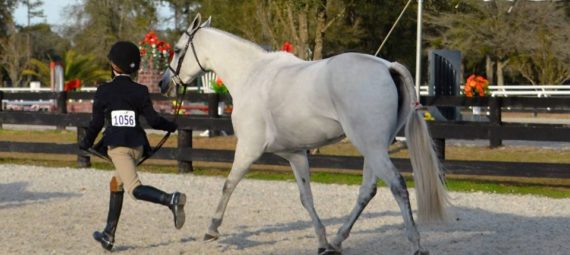
My six year old student rushed out the arena door with her determined pony, as I heard her mother call after her, “If you don’t want him to walk, plant your feet.” Her pony had jetted through the doorway, tugging the small girl alongside him. I saw the momentary struggle, but her mom was on it before I said anything.
I was struck by how simple her statement was. I have stated that concept a thousand times, but it usually involved more in-depth discussion and description on the how’s and why’s and what to do to fix it. I work with a lot of junior riders, but I’m certain I had not ever given the instructions so succinctly: If you don’t want to go the direction your horse is going, stop moving. Plant your feet. Say no.
Saying No With Horses Is Important
We’ve all had those moments, especially when learning the basic skills of handling a horse. The horse knows where he’s going: out the gate, through the door, past the mounting block. The non-expert may do nothing and let the horse wander past her, or she may try to move her body in some way that attempts to slow or stop the horse, but doesn’t quite get the job done. She may end up going along with him, skittering her feet, trying to gain a foothold to resist the horse. I’ve seen countless riders end up facing the same direction as the horse, “water-skiing” alongside the horse’s shoulder or flank as he rushes past (which may result in getting kicked). Sometimes they use their shoulder against the horse’s shoulder in an effort to stop him (which may end up with the rider getting trampled).
Neither works well. There’s no leverage, and the horse will always be stronger than his handler. At best, the horse still moves to a place not of the rider’s choosing. At worst, the rider gets hurt. What may seem like an innocuous misstep of a bossy horse has the potential for being dangerous.
We as riders need to say no and make certain the horse understands, whenever he does something different from what we asked. When things start going wrong, how does the horse know that wasn’t what you wanted? At the very least, we need to plant our feet. Make him move his feet, rather than the other way around. Side stepping, moving out of his way, or otherwise not holding your ground is a sure way for the horse to believe that he is the dominant member of your little “herd.” He’s successfully made you move your feet to accommodate him, what else is there to think?
Know Your Boundaries
Think about when someone invades your personal space. The other day, one of my students commented on bad etiquette she recently experienced on a plane. The passenger seated next to her was hogging the armrest and leaning into her. It was an uncomfortable situation. She made sure her neighbor understood that was not acceptable. Faced with the same situation, would you say something? Would you lean away or would you speak up and reassert your armrest co-ownership?
Now, back to your interaction with an equine partner: Is your horse aware of your personal space? When he pushes into you or wants to use you as a scratching post, do you let him?
Side Note: I don’t think a horse scratching on me is cute. Horses scratch on fence posts and other horses that are beneath them in the pecking order. I don’t wish to be viewed as either of those things, hence, no itching on me. I may offer to scratch my horse’s head, but that’s my choice; he doesn’t come into my space.
Let’s take that a step further. Think about when someone says or does something that makes you feel uncomfortable. How do you react? Do you say something? If you say nothing, the perception may be that it’s okay. Some folks may mistake your silence for acceptance. Perhaps you are trying to get along and not make waves. Is that okay in some situations but not in others?
I don’t have all the answers, but it’s important to evaluate your actions (or your inactions) – with horses and with humans – and know where you stand. If something is not okay, make sure you are clear. Hold steadfast in your values of correct, proper, and respectful interaction. If you are concerned that your boundaries are being breached, say something. Do something. Stand your ground.
From our earliest days, we are taught to get along with others, to “play nice.” In many instances, we need to get along to get what we want and need. We also want to be liked. In the process, we learn to fit in. Unfortunately, our innate need for social acceptance may make us less likely to speak up when something doesn’t feel right. I think that’s how online bullying, and bullying in general, has built to such a crescendo today. This also applies to the sexual harassment issues that are presently in the news.
“The only thing necessary for the triumph of evil is for good (wo)men to do nothing.” – Edmund Burke
Standing by while watching wrongs being committed is tantamount to being complicit in the act.
Inaction and Horse Welfare
The other day, I was scrolling through comments on a friend’s Facebook post. The discussion turned to someone saying that it’s difficult to speak up about abuse of horses at a place of employment when you don’t have many options for other work. The horse world is small, and word travels fast, which can make things difficult if you’re known for calling folks out for mistreating their horses. Someone else stated that we’ve all had to learn to keep our opinions to ourselves when the paycheck depends on it.
Um. Okay. That’s a perfect illustration of why the horse often gets the short end of the stick when we’re talking about large shows, big classes, points won and money (large sums spent and won) and the type of jobs that may be career-building. Not only are unethical folks doing bad things to the horses under their care – often the people that work for and around them end up going along with them. Why? They don’t feel like they can stand their ground. It’s too difficult to be the single voice of dissent, when everyone else is along for the ride. That’s how unethical behavior is allowed to continue. There’s little social pressure to discontinue doing something that is earning money and blue ribbons and new clients, if everyone seems to be on board.
Unfortunately, our need to fit in, get along, make friends, advance our career, be in the “cool crowd,” please others, and get a paycheck can put us in a position of saying yes when we should be saying no.
Mixed Messages in Social Situations
Last month, there was much in the news about a certain comedy star who had been out on a date with a woman. In an effort to keep this blog PG-rated, I’m not going to go into great detail, but if you google Aziz Ansari, you’ll get the gist. What struck me most about the incident was that neither person understood what the other one was trying to communicate. They had very different ideas of what was happening and what the other was attempting to say.
You can be in a situation where you’re not sure how you feel about it, and only realize it was a bad thing after the fact, once you’ve had a chance to process your feelings about it. You don’t know how you’ll react until you’re in the situation, and it’s conceivable that you realize it’s wrong only after it’s too late.
Learning Where You Stand (With Humans)
When you’re going through adolescence, you are in the process of learning how you feel about certain things. What kind of behavior is okay? Where is your line in the sand regarding how others treat you? How you treat others? How your friends treat others? Do you stand by while your friends poke fun at the unpopular kid? Did you stand up for someone you saw being bullied? Did you laugh when someone was the butt of a joke? How does peer pressure affect you? Are you so keen to please, to not make waves, that you stay silent or go along with the others?
As a kid, I can recall being in certain situations that seemed mildly uncomfortable at the time but, once I was home and had a chance to think about it, I realized that what had happened was not okay. New situations require new assessments. You might not know exactly how you feel about something as it’s happening. Maybe you didn’t have all the information. Maybe you found out who your real friends were.
Fortunately, I learned from those mistakes and tried my best to not repeat them. But I’ll never forget that feeling in the pit of my stomach, when I had the chance to evaluate what just happened, and in several cases wished I could go back to do things differently.
If your desire to maintain the status quo and if your need to fit in outweighs having the conversations that are difficult to have, you are destined to be a victim in certain situations. Say no. Plant your feet. Stand your ground. Do the right thing.
Know Where You Stand (With Horses)
What does all this have to do with working with horses? Actually, quite a lot. Success as a rider comes from knowing how to react at any given time. Horses have the potential to be unpredictable or dangerous when the handler or rider doesn’t have a clear idea of what she expects. In addition, we are our horses’ stewards in all things, which means doing things that are in their best interests: taking proper care – being good horsemen.
A Short Quiz
Can you say yes to the following questions:
1). Do you regularly express clear expectations to your horse?
2). Do you have conviction in all your actions when riding or handling your horse?
3). Do you think your horse respects you?
4). Do you have the highest expectations of yourself as a horseperson? (i.e., you believe horses deserve ethical treatment, and should not be treated like a piece of sports equipment.)
If you answered yes to all of these, congratulations! It’s highly likely that you are able to stand up for yourself in other areas of your life. You are not a pushover. You stand up for yourself and those that can’t do it for themselves. You are a decent person.
If you see something, say something. Say no when something isn’t right. Stand your ground.
Plant your feet!



Well said. Great blog!
Thanks, Marci!
Proud of you, my daughter! Speak up! Plant your feet!
Life is not a popularity contest.
Thanks, Mom!